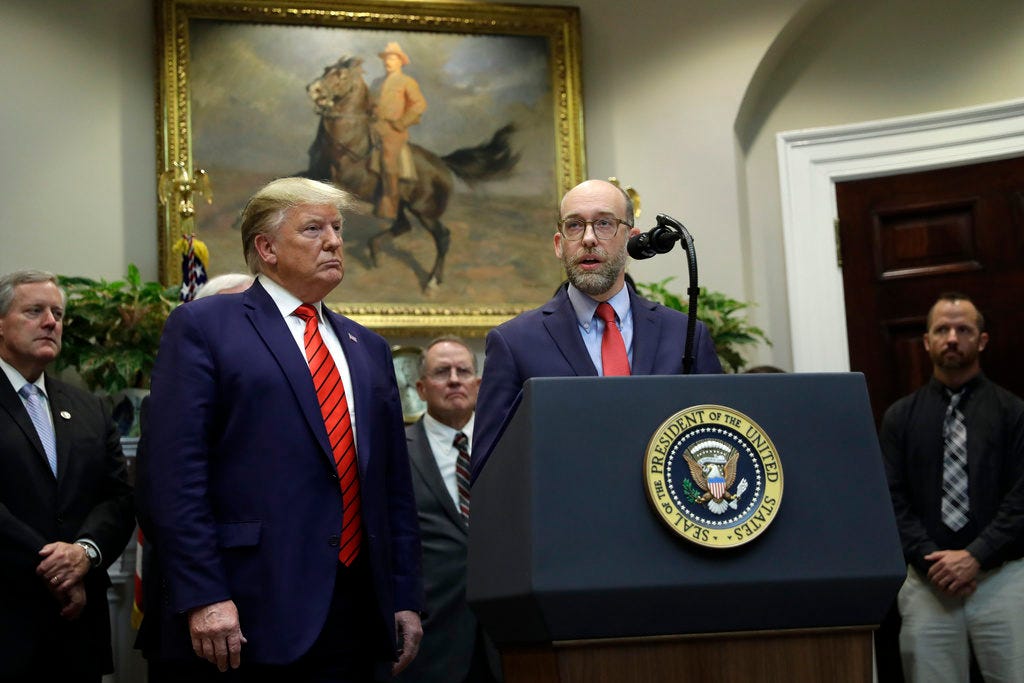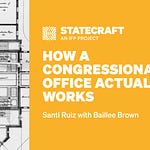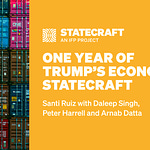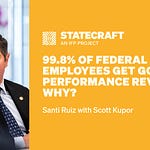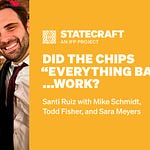Russ Vought served as the director of President Trump’s Office of Management and the Budget (OMB). When the OMB under Vought withheld military aid from Ukraine, House Democrats initiated an investigation that ultimately led to Trump’s first impeachment.
Vought now leads a think tank, the Center for Renewing America, and is reportedly building a “180-day playbook” for implementing a policy agenda for a second Trump term. On Monday, the Associated Press claimed “Vought is likely to be appointed to a high-ranking post in a second Trump administration.”
Today, we’re publishing an interview with Vought recorded in February.
We discussed:
The two approaches to running the executive branch
The Ukraine impeachment
Do presidents have the authority to refuse to spend Congressionally appropriated money?
Why we have “an imperial Congress”
Why there aren’t more conservatives in government
The podcast audio has been lightly edited for clarity. This transcript has been edited for clarity and length. Thanks to Rita Sokolova for her editorial support.
For a printable transcript of this interview, click here:
Why do OMB career staff and political appointees work in different buildings?
[NB: OMB staff work across two complexes: the Eisenhower building and the New Executive Office Building, also known as the Red Building.]
The Eisenhower building is closer to the West Wing, so you've got to fill that out with political appointees. I call them policy officials. And honestly, I think that more agencies should have some office representation in there, beyond just those that work in the West Wing, because it's so critical to stay privy to what the White House is thinking about on a day-to-day basis. And that takes work.
But it is an issue: you'd have to go across the street to have these meetings. My big meeting every week with the career OMB leadership was called the “PADs and DADs meeting,” and that’s done in the red building. I also often had director's reviews in the red building. So you do go over there as much as possible. In my last year, we actually put a political appointee in the red building.
I feel you’ve got to have more of an intermixture of career staff and political appointees in the same workspace. The separation is a historical development and there are some good reasons for it, but it’s a barrier to good government.
What are some examples of those agencies that should have representation in the Eisenhower building but do not currently?
Former Director of National Intelligence John Ratcliffe had a space to work in, but it wasn't an office built out with a lot of staff. But that was a very healthy thing because the worst thing is to have a Secretary of Defense or State be totally unconscious of where the president's head is at or what issue senior staff are dealing with that day. There's an immediacy, a churn that you've got to navigate, and it bleeds into how you write a budget 6 months ahead of time.
I don't think every Cabinet member should have an office there, but if you’re an “above-the-line” Cabinet official [those in the Presidential line of succession] you need to be thinking through, and the White House should be thinking through, how you have the commander's intent as much as possible.
Can you explain RMOs, resource management offices, for our readers?
There are five RMOs, and they’re ways of bucketing OMB work, mostly by agency. Some agencies are divided: the Food Stamp office is at the Department of Agriculture, but it's managed by the welfare RMO. It is the way that OMB organizes the jurisdictional portfolios, and for historical reasons, sometimes it is lumpy. You might have a big environmental shop that's based on one administration's view about climate change, and then you realize that the Department of Defense hasn't paid attention to anything OMB has said in 30 years. That's a result of that RMO being too small and the PAD not using the tools available.
You mentioned PADS and DADS meetings. Will you break down those two acronyms for our readers?
PADs are program associate directors, and each of them runs an RMO. DADs are deputy associate directors. Think of them as the mini-directors. PADS cover a broad range of agencies in a given RMO: the national security PAD covers the intelligence community, the Department of Defense, the State Department, and the Export-Import Bank. The PAD for health is generally just the Department of Health and Human Services.
I mention in my chapter in the Heritage book that we need more deputy PADs who can provide political leadership, policy leadership because the portfolios are just too big – we had to split one PAD that had seven major agencies into two. Career individuals can't just deduce everything. They serve a very valuable purpose, but you've got to be giving them the administration's perspective on something. You can't do that, you can't have policy battle plans, if you're just suffering constantly from bandwidth.
And OMB gets itself in trouble when it's not directly connected to the president. OMB has to be taking the president's view on something and imposing that on agencies, consistent with the law. It can't do that if the PADS are so overwhelmed that career officials are making up their own determination, or doing their best to figure out where the president might be on something.
Are RMOs the only way to structure OMB's work, or are there alternatives?
I’ve probably tinkered with OMB more than anyone and I have long-standing convictions about how the place should be run, but I certainly don't think it's the only way. But I’m a conservative and I want to preserve what OMB does well. I do think the RMOs provide great analyses and generally know their agencies really well.
It's not true that someone like me doesn't like the continuity that career staff provide. If you mess with them too much, or — Some people suggest that DADs should be political appointees — I totally reject that. You need to maintain their ability to do their job, but you just have to provide enough inputs for them to be able to know where you're coming from.
Take the BRD. The Budget Review Division, which is not an official RMO, is probably the most important one from the standpoint of writing, crafting a budget, and overall guidance. I don't think there should be much of a filter between the director personally and the career head of BRD. The career head is often the interpreter for everything the director is asking the agency to do, and political individuals just have a different way of talking than career individuals do.
From talking to you and to folks in the Biden OMB, I get the sense that the OMB apparatus is quite small relative to its job. Is that a fair representation?
It's a huge problem, government-wide.
What are the consequences of that size mismatch?
There are two views about how to run the executive branch. One is the Don Devine approach, where the president just deals with Cabinet officials and he or she is expected to interpret and then flow it down. Then there's the FDR or Nixon approach, the modern view, which is that you've got to use the tools of agencies like OMB. OMB was originally under the Treasury and known as the Budget Bureau.
In the same way that Kissinger used the National Security Council, OMB has to use its tools on behalf of the president. Honestly, I believe that's the only way to run a modern executive branch, and to do it in a way that reflects the president's interests. You just need to have enough people who can provide that feedback to the agency.
I'm a firm proponent of bolstering the number of political staff at OMB. One big separating factor between Democrats and Republicans is that Democrats tend to scale up the second floor at the Eisenhower, which is largely political appointee offices, with political appointees who don’t have actual portfolios. They’ll have special advisors, which is a position I had never heard of before. You may have talked with one of them on the management side. [NB: Cristin Dorgelo, who we interviewed in December, was “senior advisor for management” in the Biden OMB.] We probably had some version of it, but we tried to use the official roles and give them the support they needed with additional people underneath them. But we don't want to have staff that are political versions of the Budget Review Division, like what you would see under Obama and maybe under Biden.
Describe the Budget Review Division for me.
The Budget Review Division is the main organization that writes the budget. Under Obama, there was a political version of the BRD that would produce budget spreadsheets and hand them over. With that model, you lose an important link between the responsibility of the agency and the direct relationship that you need to have with career individuals to support it. I think that is a separating factor between Democrat and Republican administrations.
Walk me through that argument again: what’s the cost of bringing in political appointees to do that budget work?
I don't think there’s a cost — I want more political appointees and I want them to have real authority. But I don't want czars running around like they had for Puerto Rico. I don't want them to have portfolios of their own making and just get in everyone else's lanes. I want more appointees, in an actual chain of command, with real defined roles, who can provide real and defined policy views to career staff on behalf of agency directors and the President.
Does that distinction stem from different views about executive power? I can imagine someone saying, “If the president has a trusted Puerto Rico advisor, there's nothing wrong with setting that person loose in the agency.” What's wrong with that view?
I think it could be useful at times. I'm not making an argument that you shouldn't have that portfolio, maybe at the White House, and I've proposed some versions of that. But in managing OMB, I found that they're just not effective. Their viewpoints are often rejected by the RMOs, and there’s already a tension at OMB between the budget management side and the regulation side. As a manager, you have to work very hard to keep the “garage doors” open so everyone knows what everyone else is working on and can speak into it. Your views will not necessarily reign, but no one should be surprised by what the other functions are working on.
And, to be honest with you, the management team can have all sorts of viewpoints, many of them very important, but if a proposal has not been internalized by the RMOs, it’s not happening. I'm not saying the management side of OMB should go away, it has very important functions. I'm just saying that you’ve got to manage through this culture issue.
I don't think the right approach to solving problems is, “Russ has a passion for shipbuilding and thinks that it’s really important to the administration, so he's going to hire someone to come on and sit on the second floor and do that.” The better strategy is to work through the chain of command, to say to your PAD, “You have to make sure that this is embedded,” and control for the fact that we haven't had good shipbuilding ideas for the last three years. And in fact, that's what we did: Mike Duffey and Lucian Niemeyer made that a priority and we changed course on that, but we did it through the existing power structure.
You mentioned the “Don Devine” view of management. Will you flesh that out for me?
Don Devine is another great member of the conservative movement who ran the Office of Personnel Management (OPM). Our views differ on how a president should manage his Cabinet – I believe that you need to have Cabinet officials who support your view and who you talk with often, but they will rarely be able to evaluate policy tradeoffs across government. Your team at the White House has to ensure that those tradeoffs are considered in the policy process and reflected when you make decisions.
For example, when the CDC was managing the COVID response, I'd come to an agreement with Bob Redfield, principal to principal – he's not actually a principal in the sense of HHS, but he was head of the CDC — We’d make a determination and send it over to the CDC. And when it came back for White House review, it was like we'd never had that conversation. OMB career staff have to make sure that you're moving in the right direction, because Cabinet officials who are often on the road and the deputies who manage the shop don't have the ability to ride herd.
You mentioned FDR and Nixon as exemplars of the management style that you believe in, using agencies like OMB directly. Is there an administration that best represents the opposing view, of managing through your Cabinet?
Not really. It's one of my arguments against it. I think it's unique to a time when government wasn't quite as big. There have been presidents who leaned into it and had a vision for how to use these agencies – I would put Donald Trump in that category. The Hill, in the aftermath of impeachment, was trying to take away our apportionment authority. He threatened to veto, while he was getting impeached over an apportionment issue related to Ukraine, because of his viewpoints on executive power, and the importance of OMB and apportionment.
During COVID, when an agency rolled out an initiative, he said at a press conference that it should have gone to the White House for review. Those were examples of Donald Trump internalizing and understanding how the processes of OMB were meant to help him.
I think we had some staff reluctance — there were different camps within the staff of the White House about — is OMB at arm's length, or is it part of the White House decision-making process?
A lot of these debates seem like turf wars to protect control over certain processes. Is that a cynical view?
That’s not a cynical view. That is in fact what it is. The larger constitutional debate is probably the most profound and important for us to discuss. My view is that we now have an imperial Congress that has departed from the original concerns of progressives who wanted actual amendments to the Constitution. Because of career civil servants, the notion of independent agencies, and the loss of presidential impoundment, essentially the federal bureaucracy is now more aligned with the leadership of Congress, particularly with the committee chairs, particularly Appropriations, particularly the leadership that controls the House and Senate, and to some extent the senators who have the ability to put holds on nominations.
When I say imperial Congress, people look at me like, “What are you talking about? You've ceded so much congressional authority to the executive branch.” Yeah, for a reason. Congress has ceded lawmaking authority so that they don't have actual responsibility for it. They don't have to vote on the blend of ethanol and refiners. That's a decision that the Environmental Protection Agency, the Department of Agriculture, and the Secretary of Energy have to make, and then Congress gets to evaluate it and set the consequences. So that is what I think is broken: We have effectively merged three branches into one.
The way out of that is to pull those functions apart and give to each what is properly theirs. I’m not saying the executive branch should now retain lawmaking authority. I want to give that back to Congress, and I want a better understanding of the power of the purse. The right constitutional view is that we have ceilings provided by Congress — that is the power of the purse — but it was never meant to be a floor.
So, yeah, there were micro turf wars. The White House counsel was my number one adversary throughout the administration because they had a ridiculous and ahistorical role; it was almost as if they were in charge of the policy process. It was never really conscious, they just assumed it and no one ensured that they were playing in the proper sandbox.
I think the extent to which it's not turf is, if OMB doesn't have enough policy officials, then you're not setting them up for success. You have a career individual telling a political appointee at an important agency “No,” and that “no” may not be informed by what the president would say. That is a very unhealthy place to be and you've got to solve that.
The general thrust of the career individuals is always going to be efficiency. As a director, you need to communicate what the president is trying to accomplish and then figure out how to do it most efficiently. Then you're more likely to preserve the organization's ability over time to serve the president well.
OMB and the White House Counsel both represent the president’s agenda. Why should OMB be in charge?
I'm not stating a constitutional principle. A president and chief of staff can organize the White House however they want. But when you let the White House Counsel run it and act as a sort of deputy chief of staff — and I’m not arguing for OMB to fill that role — the president gets policy options that are very, very… risk-free. The lawyers need to consider what’s legal and show the art of the possible, but they are not their own philosopher kings. Folks should read through the opinions of the White House Counsel and assess whether they actually read the law or are playing politics themselves. They shouldn’t allocate risk and capital on behalf of the president, which I saw a lot in the administration.
The Staff Secretary was stronger than in previous administrations, and at times had responsibilities that OMB had owned. I largely didn't take issue with that because it was a good way to run the railroad, but I did have major issues with Rob Porter, who was the first Staff Secretary. I worked well with his successor, Derek Lyons, because I felt that he was performing an important role in the administration and was an honest broker who also understood that I had a job to do.
Can you outline your view on the proper division of power between the legislative and executive branches?
Under the Constitution, the legislature makes the laws and should be able to operate at a fine granularity to make the necessary tradeoffs. If they can't get down to that granularity, that's a good indicator that they're trying to legislate too precisely or encroaching on executive territory. The president is responsible for faithfully executing the laws of the country and should not be precluded by notions of independence and other things like that.
Your view on the power of the purse is that Congress's power is bounded by presidential authority in certain ways. Walk me through that argument.
We've developed this notion that Congress gives you $20 billion for a particular purpose, and you've got to use that $20 billion. I don’t think that’s constitutional – Congress has to give you an appropriation. If they don't, you can’t spend money on that purpose. Congress's power of the purse provides that appropriation, but has become unhealthy because of impoundment control, which basically removes the president’s impoundment power. We sent up a rescissions package trying to use the process and, somewhat historically, it passed the House. We lost by one vote in the Senate because Senator Burr decided to take a bathroom break.
The process didn’t work and it's all driven by Congress. Comically, we now have agencies just pushing the money out the door to stay on track with the appropriators' expectations for a particular program. Because of the use-it-or-lose-it culture, agencies are buying flat-screen TVs and new copy machines. It’s incredibly wasteful, but I'm more concerned with the constitutional aspect of it because the president has lost the constitutional ability to create tension after giving his signature. It’s one and done.
You’ve probably read that I refer to this relationship between Congressional leadership and the bureaucracy as a cartel. The Cartel doesn’t even do individual appropriations bills, but puts them all in one package and jams the executive branch with one decision, because they know that once they get that decision, they’ll have the moral and constitutional high ground, in their precedential view of it, to get their bureaucracies to come to heel.
We need to restore the president’s ability to interrogate how Congress wrote a law and its authorizing principle. We don't even do authorization bills anymore. That's supposed to be part of the overplay. You don't just have appropriators giving you a check; you have authorizers with requirements for an executive branch. And we've lost that whole process.
That became apparent when we were given a lump sum for Ukraine. We had the ability to run the policy process on how to allocate funds and guard against corruption, but people had cynical interpretations of that pause and freaked out. Ultimately, we were trying to establish how the money could be spent.
That’s not uncommon to less politically explosive debates. Appropriators want to know every time you pause the money and have since tried to make that more transparent, which I'm not a fan of. I think that has hurt the executive's ability to pursue the options that they have within the confines of the laws that Congress has given them.
You’re making two arguments here. In your January 2021 OMB memo on the Ukraine rescissions, you described the process as “taking certain steps to temporarily pause funds.”
You're also saying that this is not just about the efficient and effective use of funds, but a matter of the president’s power to impound. Is there a tension between those two views?
A president runs on a platform, gets elected, and is presented with the existing laws. Sometimes he's going to change those laws, other times he’s going to work within those parameters to accomplish his agenda, and he’ll look for opportunities to do both. Spending is in that bucket of both executing the law and also looking for opportunities created by the laws that exist to accomplish your policy purposes.
In a June 2023 interview about the Ukraine rescission debate, you said, “The reason why there wasn't an impoundment was because we did not have the authority just to pocket the money and not spend it.”
You go on to say that with a new paradigm, the administration “potentially would have had the ability to go further and pocket the money.” That seems to run counter to the law, by refusing to spend money that Congress has appropriated.
That answer was within the context of the reading of the Constitution that’s currently dominant in D.C. We were up against the fiscal year and had issues with Ukraine. To provide good advice to the president, you might say, “If you go past this and attempt to pocket the money, I believe you have a constitutional case to do it, but you have to understand that the Hill is going to read it within the context of the last 40 years.” So that's really what I was getting at there, and why I believe the debate that President Trump has kicked off is so important. Because you are now doing it from the standpoint of: “This is my understanding of the Constitution. I'm going to educate the country on it.” Who knows what the fact pattern would be, but it would be a different story.
You've been an opponent of the Impoundment Control Act. What authority does the president have under the Constitution to not spend money Congress has appropriated?
I believe that Congress provides a purpose for the appropriation and you should be able to accomplish that purpose for less money. Secondly, there are many process laws and faithfully executing them is wrapped up in both the president’s function and also in constitutional authorities that govern the use of money. With things like the debt limit, we put a statutory goal that we don't want to go past. All of these macro laws go into that specific impoundment decision about a particular pot of money and whether Congress has the constitutional authority to decide where and how much to spend. We work out some of the details in our recent paper and have more papers on this topic to come.
So your view is that if Congress appropriates some money and tags it as military aid to Ukraine, the administration is constitutionally authorized to say, “We're not spending that money. We have the ability to go further and pocket that money.”
Yeah. You’ve got to have the ability for that spending to lapse and not be tied to an arbitrary fiscal calendar. Otherwise, you might end up spending money on something that is not aligned with the foreign policy position of the Commander-in-chief and chief diplomat. I think foreign policy is probably the easiest place to work this viewpoint out.
What are the boundaries on the president's ability to, in your view, constitutionally impound money?
It certainly overlaps with other constitutional authorities and responsibilities. If you're waxing and waning in an area which is the sweet spot of the Commander-in-chief, that is going to be an area where you're going to want the president to have the benefit of the doubt on the impoundment decision that he's making.
Every president from Ford to Clinton successfully rescinded funds. George W. Bush and Obama did not. Why not?
The honest answer is that the practice fell into disuse and the agency itself almost lost institutional knowledge on it. We had to dig deep within the BRD to dust off those files and rules of engagement for how it worked. I love the BRD because they’re gnomes for that kind of information. Ultimately, if you stop using it, people forget about it. No one reads the history around it anymore or knows about the debates we had about impoundment in the ‘70s or that the executive branch was outraged by the Impoundment Control Act. I knew that we have this in the toolbox and I was really interested in using it. And the President certainly wanted to do it because it fit his emphasis on discretionary spending, foreign aid, and waste.
The common view is that a branch will use any tool available to it and won’t let it go once it has it. It’s hard to square that with the idea of tools or powers lapsing from disuse if they’re useful.
I think it's accurate. Very few people go off and dust those off. When the president asks for options, did you read the statute? Unless someone knows what options a president actually has, I don't care for them to play the lawyer for me about the art of the possible. You just nailed down one of my governing philosophies: I think political appointees have to be really aggressive in going back to underlying statutes to see what is possible. It should not merely be a matter of preserving the status quo or asking Capitol Hill, “Mother, may I?” The president has to manage his political capital, but you need to give him options consistent with the law.
What would you claim as your biggest win at OMB?
We’re probably most known for the legal framework we put forward to build the wall and identify pots of money that we had the authority to transfer for that purpose. As for managing OMB, turning over the management of the national security portfolio took us a whole year. I could never figure out why we had a fundamentally different relationship with those particular agencies than with, say, HUD. We ultimately didn't use our apportionment authority for decades. To say that using a hold made significant political waves is the understatement of the year.
We were most proud of giving President Trump know-how. For instance, ensuring that the whole bureaucracy at the Pentagon put more of an emphasis on ships because of the confrontation with China, versus just spreading butter equally across one piece of bread. We were pioneering the type of government that is necessary for an America-first, populist administration. We know that there's a perception outside of conservative circles that those types of individuals can't govern, and I believe OMB showed that that's not true. Our work at the Center for Renewing America is to prove that thesis wrong, because it has relatively high stakes if the president is re-elected, regardless of who serves in these positions.
I'm very interested in tools for presidential control in the context of the DoD – my undergrad thesis was about airstrikes in Iraq and Syria under Obama, and how that administration tried and failed to have DoD follow its guidance.
Just hearing that, I wonder about the extent to which the massive policy bureaucracy that Obama set up under national security was actually connected to the tools at OMB. OMB didn't work with the National Security Advisor until Robert O'Brien, and he and I worked hand in glove. The policy guys are not rejecting OMB, they're bringing them in and saying, “Let's collectively ride herd on an agency.”
Some folks describe a talent gap, or a lack of talented, smart conservatives willing to work as government bureaucrats. Is it real? What's the bottleneck?
I do think the Democrats in general have spent more time thinking about government and getting enmeshed in the mechanics of it. Our side goes in and out of the private sector, companies and entrepreneurship, so we don’t have enough people thinking about governing and prioritizing that art and science. I think that's almost as important, if not more important, than the actual personnel. If you don't have the right governing paradigm in place or know your tools and authorities — I don’t care how conservative your voting record has been — you're going to fail.
Personnel is policy but it's not everything. I stay away from conversations about who should do these jobs because I think that's presumptuous to some extent. The president will make those determinations. The biggest value add that my center can bring is to help think through the mechanics of government and identify the paradigms to slay, and offer a different one that is much more constitutional.
Leaving aside the usual battles with other wings of the government, any regrets or missed opportunities in your time at OMB?
Great question. I would have more preciously guarded OMB’s capital within the administration and asked, “Where are we spending our capital by saying, ‘No’?” Are we spending that capital on things that the administration actually wants to do? I learned over time to coach the agency to keep in mind that we're serving an actual president. It's not the office of the president, it is an actual president. You're serving his agenda in accordance with the law, and you have to be all-in on that agenda. And then you get the chance to say how to best accomplish it. We got better at that, and our influence within the administration grew accordingly. Even if a matter was in the trade space, the president would say, “I want it to run through OMB, because I trust that it will come out the other side of it a better product.” And that's ultimately what's so critical for a director to be thinking about.




